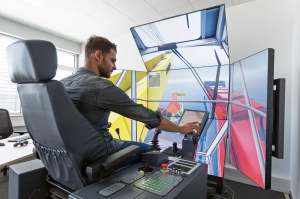


(Posted on 27/03/19)
A new Liebherr simulator is on its way to New Zealand. Port Nelson ordered a classroom solution in order to simulate ship crane and mobile harbour operation. The simulator has even the possibly to add further Liebherr crane modules in the future.
Port Nelson at the top of New Zealand’s South Island will soon have its own training simulator supplied by Liebherr. It is presently on the water on route to the port, with an arrival date for April. The simulator is actually two in one allowing for training on more aspects of real port operations, with both a generic ship crane simulator and the LiSIM version of the LHM 550 mobile harbour crane, both utilising much of the same hardware. The ship crane simulation-software features the CBG series, a floating four-rope grab crane with a boom length of 28 metres and a maximum lifting capacity of up to 45 tonnes. The LHM 550 mobile harbour crane simulator is equipped with its original LiTRONIC crane controls and has training programs installed for basic operations, bulk, breakbulk and container handling, reflecting the port’s present and future operations.
Simulators are globally recognized as a highly effective training method offering numerous advantages. The development of this sophisticated training tool was prompted by Liebherr’s extensive experience in crane operator training. Based on the original Litronic crane control system, LiSIM is the only realistic virtual solution available on the market for learning the precise and innovative control of Liebherr maritime cranes. “The simulator allows benchmarking of current driver skills and monitoring of drivers using periodic checks, plus can be used to assess new drivers for suitability without the costs associated with running a real crane, such as fuel and wear-and-tear. It will make for safer and more efficient handling in a variety of weather conditions,” Jonny Cook, the Port’s Container Operations Manager reported. “We also expect it to reduce box damage during operations,” he added.
“Port Nelson are a long-standing customer with us, and it’s great to see them buying our very first MHC simulator for Oceania,” Liebherr’s Gordon Clark commented. “There’s even the possibility to add further modules if they want to train others, for example offshore customers. It could end up being a stand-alone profit centre.” Port Nelson’s General Manager Operations, Matt McDonald sees the simulator purchase as a “step-up in safety” for the port. “Training new personnel on the quay is expensive, but also dangerous as they learn to handle large lifts, occasionally in windy or adverse conditions. We can also simulate situations that you hope never to see in real life and train people on how to react to them, the same as the aviation industry has done for years.”
As announced in April 2025, Samuel Schär has assumed his position as CEO of Bühler, effective... Read more
Leading vessel performance platform Smart Ship Hub says the industry should expect a breakthrough year... Read more
The Nordic countries are taking an important step towards decarbonising maritime transport with the... Read more
Germany’s Steelpaint has appointed ADD Marine as its representative for Greece and Cyprus, strengthening... Read more
Rio Tinto’s first Pilbara-made iron ore rail car has rolled off the production line in Karratha... Read more
Precision meets progress at Phu My Port, Vietnam. The LPS 550 has been deployed to handle bulk commodities... Read more
bound4blue, a global leader in wind propulsion systems, has expanded its industrial footprint in Asia... Read more
As the industry explores multiple decarbonisation pathways, methanol is gaining attention as a practical... Read more
Technology group Wärtsilä will supply an integrated hybrid propulsion system for a bulk carrier... Read more
Superior Industries, Inc., a US-based manufacturer and global supplier of bulk material processing and... Read more